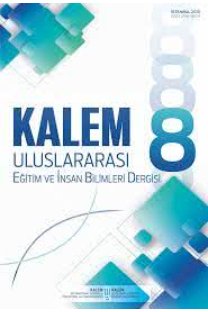Sınıf Öğretmenleri Hayat Bilgisi Derslerinde Örnek Olay Yazıyor: Bir Öğretmen Eğitimi Süreci
Elementary School Teachers Writing Case Studies In Life Studies Course: A Teacher Training Process
___
- Aydın, M. Z. (2011). Okulda ahlak eğitimi ve ahlak öğretiminde örnek olay incelemesi yöntemi. Ankara: Nobel Yayıncılık.
- Badger, J. (2010). Classification and framing in the case method: Discussion leaders’ questions. Journal of Further and Higher Education, 34(4), 503-518.
- Beckisheva, T., Gasparyan, G. A. ve Kovalenko, N. A. (2015). Case study as an active method of teaching business English. Procedia Social and Behavioral Sciences, 166, 292-295.
- Bolger, N., Davis, A. ve Rafaeli, E. (2003). Diary methods: Capturing life as it is lived. Annual Review of Psychology, 54, 579-616.
- Farahani, L. A. ve Heidari, T. (2013). Effects of the case-based instruction method on the experience of learning. Journal of Biological Education, 48(1), 40-45.
- Kabapınar, Y. ve Baysal, Z. N. (2004). İlköğretimde hayat bilgisi ve sosyal bilgiler öğretimine yaşamın kendisini taşımak: gazete haberinin kullanıldığı bir öğretimin tasarlanması ve değerlendirilmesi, Kuram ve Uygulamada Eğitim Yönetimi, 10(39), 384-419.
- Kabapınar, Y. (2009). İlköğretimde hayat bilgisi ve sosyal bilgiler öğretimi. Ankara: Maya Akademi.
- Kabapınar, Y. (2012). Kuramdan uygulamaya hayat bilgisi ve sosyal bilgiler öğretimi. Ankara: Pegem Akademi Yayıncılık.
- Lengyel, L. ve Vernon-Dotson, L. (2010). Preparing special education teacher candidates: Extending case method to pratice. Teacher Education and Special Education, 33(3), 248-256.
- McNiff, J. ve Whitehead, J. (2002). Action research: Principles and practice. London and Newyork: Taylor & Francis Group.
- Milli Eğitim Bakanlığı [MEB], (2009). İlköğretim hayat bilgisi dersi 1-3. sınıflar öğretim programı. Ankara: Milli Eğitim Basımevi.
- Morris, R. V. (2001). Drama and authentic assessment in a social studies classroom. The Social Studies, 92(1), 41-44.
- Özkan, Ö. (2010). Örnek olay yönteminin hayat bilgisi dersi öğrenme ortamlarında kullanımının etkililiği. Yayınlanmamış yüksek lisans tezi, Marmara Üniversitesi Eğitim Bilimleri Enstitüsü.
- Ütkür, N. (2016). Öğretmenlerin kullandıkları yöntem ve teknik farklılıkları: Hayat bilgisi dersi örneği. Abant İzzet Baysal Üniversitesi Eğitim Fakültesi Dergisi, 16(USBES Özel Sayı II), 1631-1651.
- Ütkür, N., Kabapınar, Y. ve Önder, A. (2016). Örnek olay yönteminin hayat bilgisi derslerinde kullanımına yönelik bir eylem araştırması. Hasan Ali Yücel Eğitim Fakültesi Dergisi, 13(2), 41-58.
- Patton, M. Q. (2014). Nitel araştırma ve değerlendirme yöntemleri. M. Bütün ve S. B. Demir, (Çev. Ed.), Ankara: Pegem Akademi Yayıncılık. (Orijinal çalışma basım tarihi 2014.)
- Rosler, B. (2008). Process drama in one fifth-grade social studies class. The Social Studies, 99(6), 265-272.
- Schroeder, C., Scott, T. P., Tolson, H., Huang, T. ve Lee, V. (2007). A meta-analysis of national research: Effects of teaching strategies on student achievement in science in United States. Journal of Research in Science Teaching, 44(10), 1436-1460.
- Yıldırım, A. ve Şimşek, H. (2011). Sosyal bilimlerde nitel araştırma yöntemleri. Ankara: Seçkin Yayınevi.
- Yurdugül, H. (2005, Eylül). Ölçek geliştirme çalışmalarında kapsam geçerliği için kapsam geçerlik indekslerinin kullanılması. XIV. Ulusal Eğitim Bilimleri Kongresi içinde. Pamukkale Üniversitesi’nde yapılan kongre, Denizli.
- ISSN: 2146-5606
- Yayın Aralığı: 2
- Başlangıç: 2011
- Yayıncı: Kalem Vakfı Okulları
Ivan Illich’in Yabancılaşma Anlayışı Bağlamında Modern Üniversite Eleştirisi
Abdullah DURAKOĞLU, Beyhan ZABUN
Ergenlerde Ebeveyn Tutumları ve Duygusal Zekâ İlişkisi: Benlik Saygısının Aracı Rolü
Ferzan CURUN, Duygu ORÇUN YÜCEL
Aile Katılımında Alternatif Arayışları: İzmit Roman Aileleri Örneği
Tuğba KONAKLI, Şöheyda GÖKTÜRK
Duygusal Zekânın Liderlik Üzerine Etkisi: Okul Yöneticileri Üzerine Bir Araştırma
Sınıf Öğretmenleri Hayat Bilgisi Derslerinde Örnek Olay Yazıyor: Bir Öğretmen Eğitimi Süreci
Nur ÜTKÜR, Yücel KABAPINAR, Alev ÖNDER
Huzurevinde Kalan Yaşlılarda Depresyon ve Benlik Saygısı İlişkisi
Elvan KİREMİTÇİ CANIÖZ, Hamit COŞKUN
Okul Öncesi Öğretmenlerinin Mesleğe Yabancılaşma Düzeylerinin Bazı Değişkenler Açısından İncelenmesi
Farklılıklara Saygı Eğitim Programının Öğrencilerin Farklılıklara Saygı Düzeyine Etkisi
Engelli Çocuğa Sahip Ebeveynlerin Duygusal Sağırlık ve Psikolojik İyi Oluş Düzeylerinin İncelenmesi
